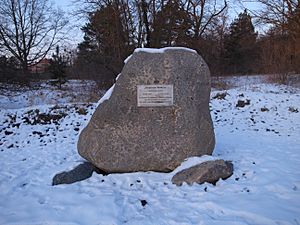Johannes Winkler facts for kids
Quick facts for kids
Johannes Winkler
|
|
|---|---|

in Dessau
|
|
| Born | 29 May 1897 Bad Carlsruhe, German Empire
present-day Pokój, Poland |
| Died | 27 December 1947 (aged 50) -- stroke Braunschweig-Querum
|
| Scientific career | |
| Fields | Aerospace engineering |
| Institutions |
|
| Notes | |
|
1st President VfR (1927)
|
|
Johannes Winkler (born May 29, 1897 – died December 27, 1947) was a German rocket expert. He helped start the first German rocket club, the "Verein für Raumschiffahrt" (VfR). This club was also known as the Spaceflight Society.
Winkler was a pioneer in rocket science. He launched one of Europe's first successful rockets that used liquid fuel. This happened after other successful liquid-rocket launches by Friedrich Wilhelm Sander in 1929.
Contents
Early Life and Studies
In 1915, Johannes Winkler joined the German army during World War I. He was injured the next year and spent a long time in the hospital.
After he got better, he studied to become a machinist. He went to a technical college in Danzig (now Gdańsk, Poland). Later, he found a job at a company called Junkers.
Starting the Spaceflight Society
On July 5, 1927, Winkler helped create the Verein für Raumschiffahrt (VfR). This group was very important for early rocket development.
He became the society's first president. He also edited their journal, called Die Rakete (The Rocket).
Pioneering Rocket Launches
Winkler made history with his rocket launches. He worked on rockets that used liquid fuel.
The HW-I Rocket
On March 14, 1931, at 4:45 PM, Winkler launched his first rocket. It was called the Hückel-Winkler I (HW-I). The launch happened at a drill field near Dessau, Germany.
Winkler had planned for the HW-I to fly up to 500 meters high. However, the rocket turned and flew sideways instead. It landed about 200 meters from where it took off. The highest point it reached was not recorded. This rocket was special because it used liquid oxygen and liquid methane as fuel.
The HW-II Rocket
About 18 months after the HW-I flight, Winkler launched another rocket. This was the HW-II, launched on October 6, 1932. It was a public event, with officials from the Königsberg council watching.
Sadly, this launch did not go as planned. The rocket exploded just seconds after it started. This happened because a fuel valve was not working correctly.
Later Work
Johannes Winkler designed many other rockets. He also worked on JATO units. JATO stands for "Jet Assisted Take-Off." These units help airplanes take off more quickly.
He designed these for Junkers and later for a government aviation research institute. However, none of these later designs were actually built and flown.
Honours
Johannes Winkler is remembered for his important work. A small crater on the far side of the Moon is named after him. It is called the Winkler crater.
See also

- In Spanish: Johannes Winkler para niños

